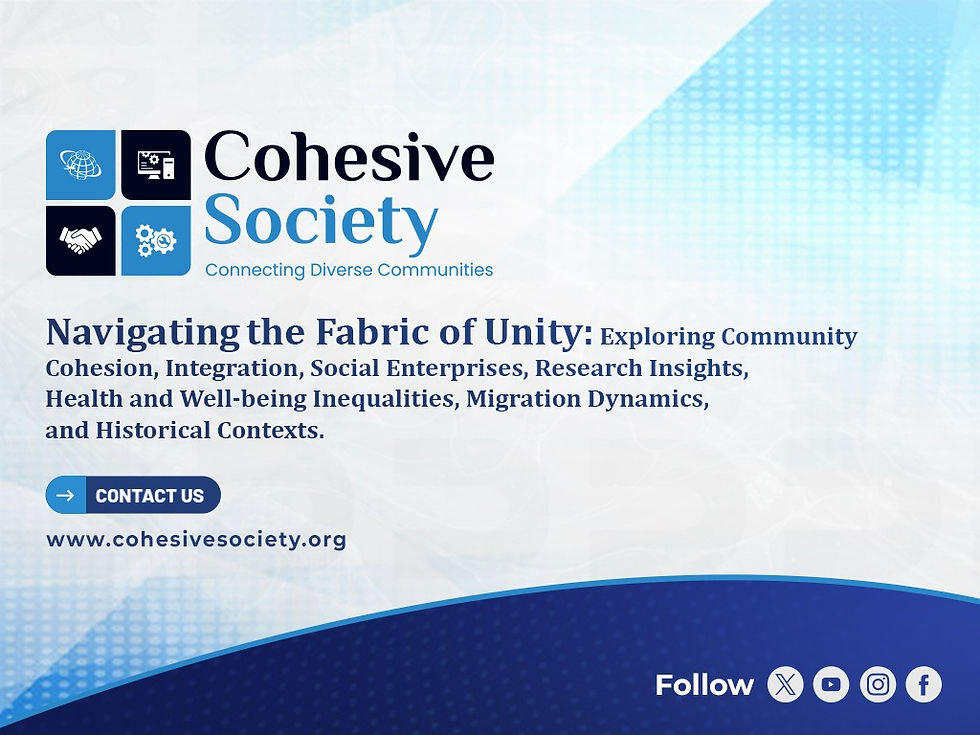Overlooked Communities, Overdue Change: How Services Can Better Support BME Communities
- Cohesive Society

- Mar 25, 2024
- 3 min read
Updated: Mar 29, 2024


cohesive society
Introduction
In the landscape of society, Black and Minority Ethnic (BME) communities constitute a vibrant tapestry of cultures, traditions, and perspectives. Yet, despite their rich contributions, these communities often find themselves overlooked and underserved by mainstream services. From healthcare disparities to educational inequalities, systemic barriers persist, hindering the full participation and well-being of BME individuals. In this blog, we delve into the challenges BME communities face and explore strategies for services to better support and empower them.
Understanding the Challenges
BME communities encounter a myriad of challenges stemming from systemic racism, cultural insensitivity, and institutional biases. These challenges manifest across various sectors, including healthcare, education, employment, housing, and criminal justice. Health disparities, for instance, result from inadequate access to culturally competent care, language barriers, and racial discrimination within healthcare systems. Similarly, educational inequalities arise from disproportionate disciplinary actions, limited representation in curricula, and inadequate support for English language learners.
Moreover, socioeconomic factors such as poverty, unemployment, and housing insecurity intersect with racial disparities, exacerbating the marginalization experienced by BME communities. Discriminatory practices in hiring, promotion, and pay perpetuate economic inequalities, trapping many BME individuals in cycles of poverty and social exclusion.
Empowering BME Communities
To address these challenges, services must adopt a proactive and inclusive approach that centres on the needs and experiences of BME communities. This involves dismantling systemic barriers, amplifying diverse voices, and fostering partnerships with community-based organizations. Here are several strategies for empowering BME communities:
Cultural Competence and Sensitivity Training: Healthcare providers, educators, and service professionals must undergo training to develop cultural competence and sensitivity. This includes understanding BME communities' unique cultural backgrounds, beliefs, and practices to provide more effective and respectful services.
Representation and Diversity: Increasing the representation of BME individuals in leadership positions, decision-making bodies, and service delivery teams is crucial for ensuring that the needs of diverse communities are adequately addressed. Furthermore, incorporating diverse perspectives and experiences into policies, programs, and curricula promotes inclusivity and equity.
Language Access and Support: Language access services such as interpretation, translation, and bilingual staff facilitate communication and enhance accessibility for non-English-speaking individuals. Additionally, offering culturally relevant resources and support networks helps BME communities navigate systems and access essential services.
Community Engagement and Participation: Engaging BME communities in decision-making processes, program design, and service delivery fosters trust, collaboration, and ownership. Community-led initiatives, advisory boards, and outreach efforts empower individuals to advocate for their needs and drive positive change.
Intersectional Approaches: Recognizing the intersecting identities and experiences of BME individuals—including gender, sexuality, disability, and immigration status—is essential for addressing complex forms of discrimination and marginalization. Intersectional approaches ensure that services are responsive to BME communities' diverse needs and realities.
Anti-Racism and Equity Initiatives: Implementing anti-racism policies, equity frameworks, and accountability measures within organizations and institutions is critical for dismantling systemic racism and promoting fairness and justice. This includes addressing hiring practices, service delivery, and resource allocation biases.
Moving Forward
Creating inclusive and equitable services requires a collective commitment to systemic change and social justice. By acknowledging and addressing the systemic barriers perpetuating inequalities, services can better support and empower BME communities. It is imperative to centre the voices and experiences of those most affected by inequities, prioritize community-led solutions, and work collaboratively towards a more just and inclusive society for all. As we embark on this transformation journey, let us heed the call for overdue change and strive to build a future where every individual, regardless of race or ethnicity, can thrive and flourish.





Comments